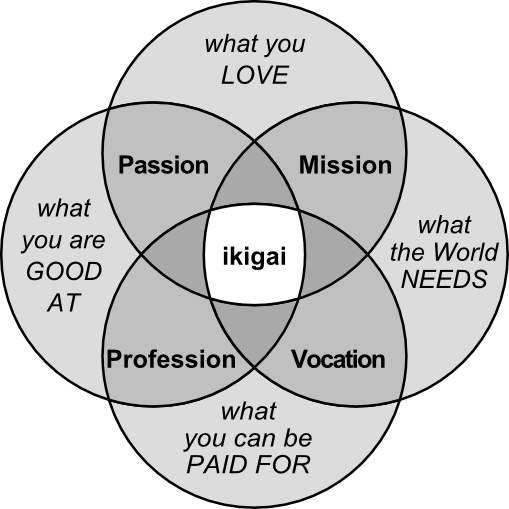Ikigai: What is Your Reason for Being?
- By
- Steve Williamson, VP Digital Content at eRep
- Posted
- Monday, November 7, 2022

People want to be productive. We all want to bring our passion, mission, profession and vocation into alignment to find that perfect reason for being, what the Japanese call 'ikigai.' What is your reason for being?
There are four aspects of professional happiness that, when brought together in alignment and harmony, create a sense of what the Japanese call 'ikigai,' which roughly translates into English as 'reason for being.'
Like a four-lobed Venn diagram, you can map out these four characteristics to determine your ideal passion, mission, profession and vocation.
It's challenging to excel at something you dislike.
To start finding your state of ikigai, answer these four questions:
What are you good at?
Both nature and nurture play a part in determining what you are good at. Consider the interplay between your aptitudes and your emotional hardwiring. What you enjoy will in part determine what you're good at because it's challenging to excel at something you dislike.
Your natural aptitudes, once identified, can determine the educational and training paths you pursue. Are you intuitive or rational? Are you creative or analytical? Do you prefer to lead from the front or do you make your best contribution playing a supportive role?
→ The Core Values Index™ psychometric assessment can help you accurately identify these characteristics of your personality's DNA.
What do you love?
What you love is your subjective perspective about activities and endeavors that bring you a natural state of joy.
What you love isn't something you can train up or manufacture.
The activities and jobs you have pursued in the past may or may not align with what you love to do. Unfortunately, most people aren't fortunate enough to pay the bills doing what they love (how many people get to pay their bills by taking their grandkids to the park?)
Take a moment to reflect on the core nature of the activities you've enjoyed most in life. What is it about them that sparks your inner joy?
What does the world need?
There is a practical side to finding your own reason for being. You must find a profession that provides value to others. What does your neighbor need? What about your community? Your nation? The world?
Feeling useful comes from providing something of value to others.
When we identify the needs of the world around us and play an active and useful role in meeting those needs, we feel a growing sense of self-worth and purpose.
What can you be paid for?
Your vocation is defined by lining up what you are good at with what you can be paid for. It is when preparation meets opportunity, and the reward is compensatory.
We all have bills to pay (even the rich), and finding the things we can do that are valuable to others, things that align with our natural aptitudes and the things we love, should culminate in the tangible rewards of money and other forms of compensation.
It's a good feeling to pay the bills every month, but it's even better to pay those bills by doing what you love.
Defining Your Reason For Being
When you combine what you are good at with what you love, you find passion.
Take what you love and match that up with what the world needs and you will find your mission.
What you are good at applied to a job for which you can be paid equals your profession.
If you provide what the world needs and find a way to get paid for it, you have your vocation.
Blend that together and you get this formula:
Passion + Mission + Profession + Vocation = ikigai
What is your reason for being?
Core Values Index™ and CVI™ are trademarks of Taylor Protocols, Inc.
Go to eRep.com/core-values-index/ to learn more about the CVI or to take the Core Values Index assessment.

Steve Williamson
Innovator/Banker - VP Digital Content at eRep
Steve Williamson writes about work, teams, and the practical challenges of building systems that have to function in the real world. His background spans three decades of project management, software development, and technical team leadership across a range of industries. Outside of eRep, Steve is the author of a series of fantasy novels and most recently a murder mystery set in Portland, Oregon, and enjoys cycling and old-school tabletop role-playing games.
View additional articles by this contributor
Essentials
Additional Reading
Stay Updated
Employer Account Sign-up
Sign up for an employer account and get these features and functions right away:
- Unlimited Job Listings on eRep.com
- Applicant Search
- Applicant Tracking System (ATS)
- Unlimited Happiness Index employee surveys
- 3 full/comprehensive CVIs™
- No credit card required — no long-term commitment — cancel at any time
